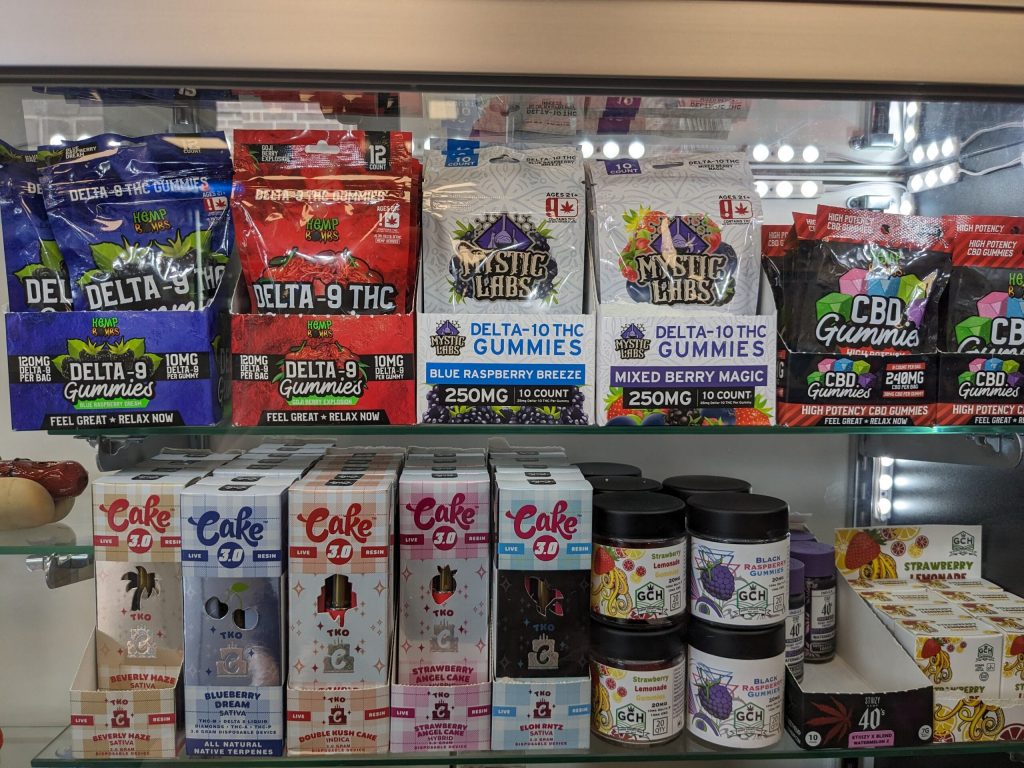Wisconsin Lawmakers and Hemp Producers Both Want New Regulations on THC
But they disagree on structure.

A glass class display of THC-infused products at a snack shop in Madison, Wisconsin. Richelle Wilson/WPR
THC products and dispensaries are popping up across Wisconsin, with producers and sellers seeing a boom in demand for the hemp-derived alternatives to cannabis.
Marijuana remains illegal in the state, but due to a loophole in the 2018 Farm Bill, companies can create and sell products containing cannabinoids extracted from hemp like THCA and delta-8.
Last month, Republican state Reps. Lindee Brill and Jim Piwowarczyk introduced a bill that would redefine hemp products under state statute, effectively banning psychoactive THC products in Wisconsin.
Brill told WPR that she has heard “horror stories” from constituents who have experienced health issues after consuming these products, often not realizing the beverage or candy they were ingesting contained THC.
“Creating an industry within a loophole in a law that was unintended to legalize this is a dangerous precedent to set,” Brill said. “We have a lot of areas within public safety and personal safety that need to be navigated.”
She pointed to difficulties for law enforcement to measure THC impairment for drivers, people on probation or those using concealed carry.
Dispensary owners worry ban would ‘destroy’ business
Hemp dispensary owners and THC producers like Jeremy Smith agree about the need for some types of regulation, but he told WPR’s “Wisconsin Today” that an outright ban would devastate his Waukesha-based company.
Smith is the president and CEO of TabEASE, which manufactures and sells hemp-derived THC products. Last year, his company acquired a chain of dispensaries in an effort to vertically integrate his business.
“I built an entire supply chain, manufacturing, retail, wholesale — all compliant under current law — and a ban would destroy that infrastructure overnight,” Smith said. “It wouldn’t make THC go away by any means. It would just push the business underground or across state lines, and that means lost jobs, lost tax revenue and less consumer safety.”
He said his company is strict about its product testing, age verification and compliance, and he would welcome more formal rules for the industry to protect consumers.
Smith acknowledged that the laws aren’t as clear as they could be and enforcement can be tricky.
“We want smart regulation: required testing, labeling, child-resistant packaging and age-restricted sales,” Smith said. “We’ve proven that responsible cannabis commerce can exist in Wisconsin. We just need a framework that protects consumers without killing the innovation.”
Brill does not support the legalization of marijuana in Wisconsin but said the people that do should seek to have it regulated in other legislation, similar to alcohol.
In the meantime, she sees the ability to sell THC products as not worth the risk.
“Does it hurt me that potentially small businesses would lose their business? Absolutely. But I think these businesses were created in a high-risk situation, knowing that this could happen,” Brill said. “In my mind, the safety of children, the safety of our community, is always going to trump business.”
A new effort to legalize medical marijuana
While Brill and some of her colleagues are working to ban commercially available THC products, other Republicans in the state Legislature are pushing for medical marijuana to be legalized.
Last week, Senate President Mary Felzkowski and others introduced a new bill to create licensing for medical cannabis in the state, though similar efforts in the past have been unsuccessful.
For TabEASE, Smith said adding medical marijuana in Wisconsin could build off of the existing hemp industry in the state..
“We don’t look at it as we’re hemp and you’re marijuana. We’re all in this for the plant,” Smith said. “That is exactly why we’re all investing and reinvesting into Wisconsin infrastructure so that we can be able to participate in any type of medical or recreational (marijuana) bills that Wisconsin does plan to go with.”
He sees the eventual move toward legalized marijuana as inevitable, given the legalization in surrounding states and the growing demand in Wisconsin.
“It’s not going away, and there’s no way of restricting it from being in our state.” Smith said. “I think we need to start looking at, how do we regulate? How do we make it safe with the existing infrastructure that we do have?”
Wisconsin lawmakers and hemp producers both want regulations on THC products. They disagree on how was originally published by Wisconsin Public Radio.
If you think stories like this are important, become a member of Urban Milwaukee and help support real, independent journalism. Plus you get some cool added benefits.
More about the Legalizing of Marijuana
- Wisconsin Voters Back Legal Weed, Lawmakers Still Say No - Anya van Wagtendonk - Feb 12th, 2026
- Wisconsin Lawmakers and Hemp Producers Both Want New Regulations on THC - Lorin Cox - Oct 7th, 2025
- Hesselbein Will Revive Medical Marijuana Bill - Anya van Wagtendonk - Dec 16th, 2024
- Data Wonk: Will State Move to Legalize Marijuana? - Bruce Thompson - Sep 25th, 2024
- Data Wonk: Should Wisconsin Legalize Marijuana? - Bruce Thompson - Sep 18th, 2024
- Indigenous-Led Campaign Launches to Support Medical Marijuana - Isiah Holmes - Sep 4th, 2024
- How Delta-8 Impacts Marijuana Debate in Wisconsin - Richelle Wilson - Jun 18th, 2024
- Milwaukee Officials Praise Rescheduling of Cannabis by Biden - Isiah Holmes - May 20th, 2024
- What Will Wisconsin Do Now That Feds Are Moving to Ease Marijuana Restrictions? - Rich Kremer - May 2nd, 2024
- A Better Wisconsin Together Renews Call for Cannabis Legalization - A Better Wisconsin Together - Apr 20th, 2024
Read more about Legalizing of Marijuana here





















